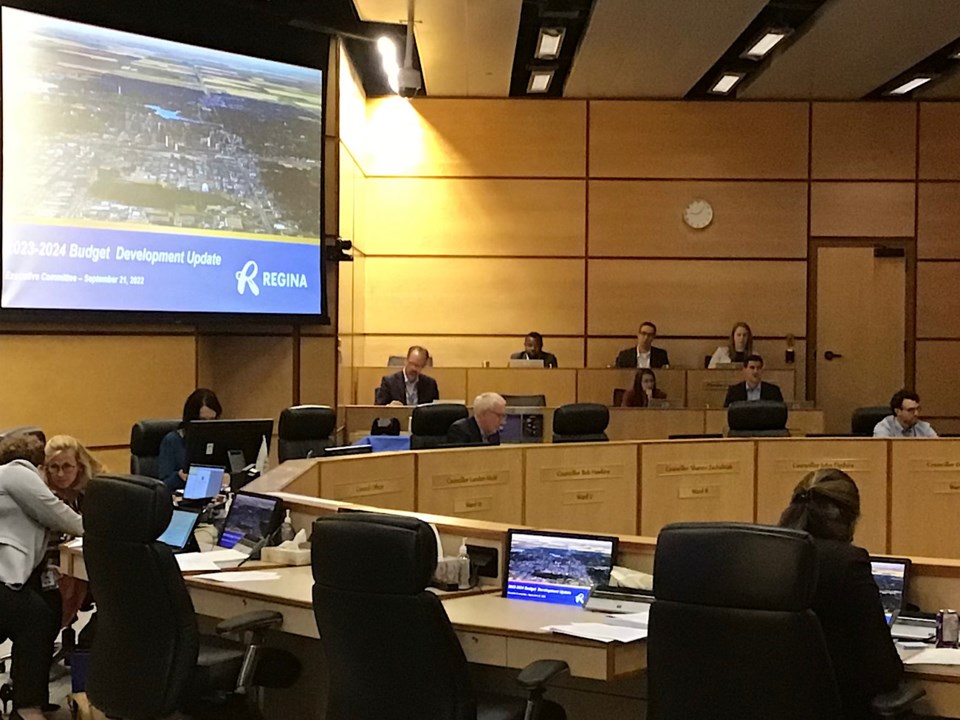REGINA — Regina city council got a look at possible mill rate increases for 2023 and 2024 at their Executive Committee meeting Wednesday.
Administration provided its budget development update of the city’s two-year operating and five-year capital budget, with the budget document expected to be presented to council in November.
But what will be in the budget in November is far from settled, as some councillors wanted to push their own priority items — items which, if included in the final budget, could potentially add significantly to the potential mill rate increase facing Regina taxpayers.
According to numbers presented to Executive Committee on Wednesday by the city’s Executive Director of Financial Strategy and Sustainability Barry Lacey, the mill rate looks to go up 4.02 per cent in 2023 and then 3.96 in 2024. The city is also looking at utility rate increases of 4.5 per cent in 2023 and four per cent in 2024.
These numbers are preliminary, said Lacey, and provided to facilitate discussion. Driving the mill rate increases are initiatives to advance strategic priorities on both the operating and capital side.
But it was the initiatives not being considered that drew the biggest discussion. Approximately $19.7 million in operating initiatives were not included due to funding process, including a possible $15.4 million a year operating, plus capital, towards ending homelessness.
That omission drew a reaction from Councillor Dan LeBlanc, who had spearheaded the council motion that passed in June calling to end homelessness in the city.
“I would like Mr. Lacey or someone to read the language of MN22-3 which we passed respecting solving homelessness and explain why it isn’t included in the draft budget,” LeBlanc said. His understanding was that administration was directed, according to the motion, to include full operational funding to solve homelessness throughout the city using the Housing First supportive housing model, with this draft funding to be demarcated in a line item.
LeBlanc made it known he wanted to see the item clearly included in the draft budget book. The indication is this will come back at budget time and final decisions made at that time whether to include it or not. But Lacey made clear that including this item in the final budget would mean adding another 5.5 per cent to the mill rate.
Also not currently being considered are some transit plan service enhancements such as a $2.6 million operating increase to weekend service, free transit for high school students (estimated at $1.1 million lost operating and an additional $3.3 million capital), and free transit for seniors from 10 a.m. to 2 p.m. (which requires $600,000 annually).
Administration made it known the service enhancements would be further considered when road work along 11th Avenue is completed in 2025-26. Regarding free transit for high school students, it was also noted the city didn’t have enough buses to support the program. The annual cost was estimated at $1.9 million.
Councillor Shanon Zachidniak, who appeared online, posed questions on why weekend transit and the East Transit hub land purchase were being deferred and also wanted to know about investments and staffing to address energy and sustainability.
“The investments in the energy and sustainability framework are not good enough,” said Zachidniak. “Yes, we have lots of hard work to do to meet our goals, and this work will not get easier or less expensive if we delay. We can’t afford to put it off, not even a year, or we will not meet our targets.”
The direction of the entire discussion alarmed Councillor Bob Hawkins, who made clear he thought taxpayers would hit the roof over the prospect of increased taxes.
“I am deeply concerned that the residents of Regina listening to this budget discussion will be in a catatonic state of panic,” said Hawkins.
“These are people who are paying very high food bills, who are finding interest rates on their mortgage rising, who are being squeezed by an economy, listening to us talk about a kind of utopian state of budget making. And that’s not what we do.”
He noted the suggestion of a four per cent mill rate increase was “already the limit of what people can take.”
“Quite frankly, I want to say to the residents of Regina that I’m not going to vote for, and I don’t think the majority of this council is going to vote for, a 12 per cent or a 13 per cent or a 14 per cent mill rate increase. So just that reality check at this point. The process of budget making does not go on incrementally all year, with each one of us dumping in our favourite project and that produces a budget. The process of budget making takes place when all of the issues are out on the table, and then, and this is the key, and then we have to make reasoned trade-offs, keeping in mind what our citizens can afford in a very difficult economy. I don’t think we should lose sight of that. I don’t think that the administration lost sight of it and I think we should take care that we don’t scare people, that we don’t discourage investment in the city because potential investors feel that we’ve lost our minds.”
Hawkins added that a “lot of what I’ve heard today is overtaxing”, and he wanted to make sure that doesn’t happen.
The next steps for the budget process in Regina is for public engagement to happen in the fall, as well as service partner budget submissions in November. The proposed budget release is set to happen in late November, followed by the budget discussions and approval expected in mid-December.





